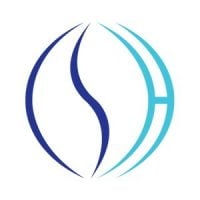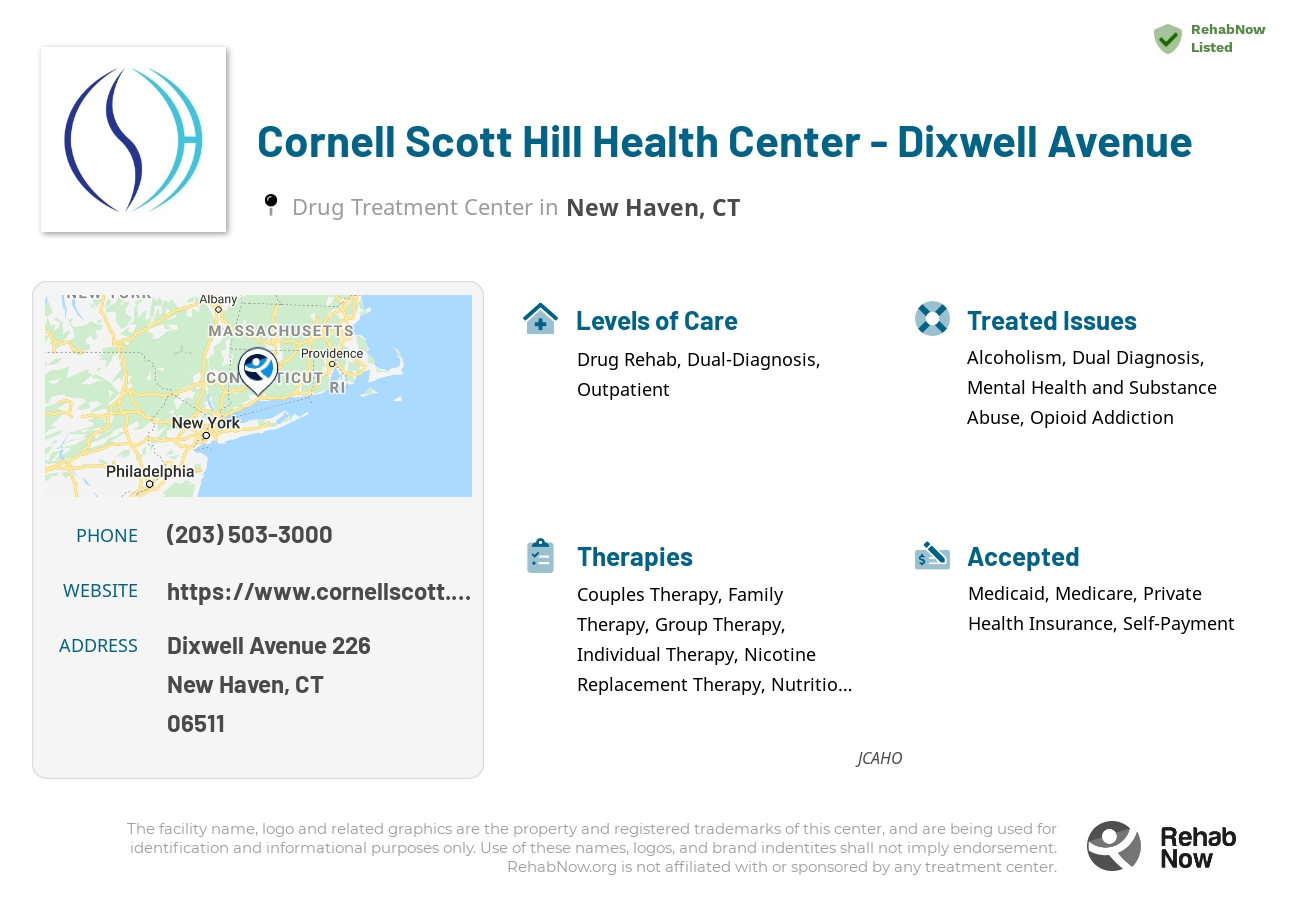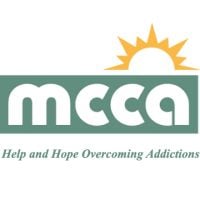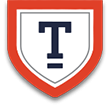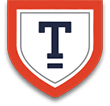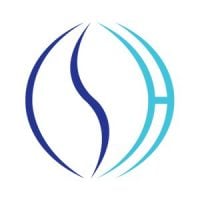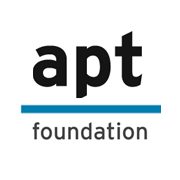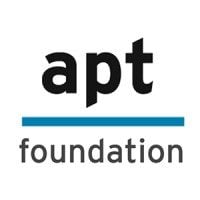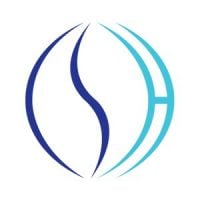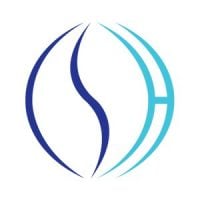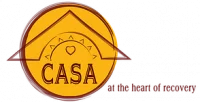Cornell Scott Hill Health Center - Dixwell Avenue
Drug Rehab Center in New Haven, Connecticut
Cornell Scott Hill Health Center - Dixwell Avenue is an outpatient facility providing comprehensive medical, mental health, and substance abuse treatment to individuals in the local community, with a focus on holistic and patient-centered care.
About Cornell Scott Hill Health Center - Dixwell Avenue in Connecticut
Cornell Scott Hill Health Center - Dixwell Avenue in New Haven, Connecticut is an outpatient facility that offers comprehensive primary and trauma-informed medical, mental health, and substance abuse treatment to individuals in the local community and surrounding areas. As a patient-centered and holistic health care provider, their core mission is to ensure that all individuals have access to quality and affordable healthcare. The health center offers a variety of services and programs to adults, youth, and families from all backgrounds, orientations, and cultures.
Cornell Scott Hill Health Center - Dixwell Avenue provides a full range of treatment options for addiction and substance abuse. Their services include individualized assessments, individual and group counseling, medication-assisted treatment, holistic approaches such as yoga and meditation, and intensive outpatient and opioid treatment programs. They also offer a wide range of supportive services including housing assistance, transportation assistance, case management, health education, and prevention and links to community resources.
In addition to its broad range of services, Cornell Scott Hill Health Center - Dixwell Avenue is accredited by The Joint Commission and has received a National Quality Forum recognition, a National Patient Safety Award, and a Substance Abuse and Mental Health Services Administration (SAMHSA) Block Grant Award. The health center is also certified by the Connecticut Department of Mental Health and Addiction Services and is a member of the Connecticut Health Information Network (CHIN) and the Connecticut Association for Behavioral Health.
Genders
Ages
Modality
Additional
Accreditations

JCAHO
Conditions and Issues Treated
Treatment for opioid addiction is best made with the help of medical professionals who are experienced in dealing with these types of drugs. This treatment can involve medications, exercise, behavioral therapy, and counseling sessions. It is important to note that the effectiveness of treatments for opioid addiction vary, so it is vital to research which treatment options are suitable for each individual.
Many people who struggle with opioid addiction need to attend specific programs like methadone , Suboxone or Vivitrol clinics.
These types of programs will provide the patient with legal, prescription medications that can help them overcome their cravings for illegal opioids like heroin or fentanyl . If the patient has a chronic condition like Hepatitis C, they must undergo treatment before they can begin taking these medications.
Individuals who are addicted to drugs and/or alcohol often have one or more co-occurring mental health disorders. Addressing both the addiction and the mental health problems at facilities like Cornell Scott Hill Health Center - Dixwell Avenue can be very beneficial for these individuals.
Common mental health conditions that often co-occur with addiction include:
- Anxiety Disorders – People with drug and alcohol problems often suffer from anxiety disorders such as panic disorder, obsessive-compulsive disorder, social anxiety disorder, and generalized anxiety disorder.
- Depression – One of the most common mental illnesses co-occurring with addiction is major depressive disorder.
- Attention-deficit hyperactivity disorder (ADHD) – Many people with drug and alcohol problems also suffer from ADHD.
- Bipolar Disorder – People with bipolar disorder are more likely to suffer from drug and alcohol problems than the general population, and vice versa.
Levels of Care Offered
This center offers a variety of custom treatment tailored to individual recovery. Currently available are Drug Rehab, Dual-Diagnosis, Outpatient, with additional therapies available as listed below.
Outpatient treatment can be considered the lowest intensity level of addiction treatment in New Haven, CT. It is ideal for early phase addiction or lower intensity addictions. Cornell Scott Hill Health Center - Dixwell Avenue peer group support, 12-step programs, and individual counseling are likely to be involved.
Therapies & Programs
Individual therapy is ideal for addicts who want to focus on themselves. It can also be helpful for those whose withdrawal symptoms are exacerbated by the presence of other people.
Benefits of individual therapy are:
- Access to a personalized treatment plan that focuses on the individual needs of the addict
- More privacy during treatment sessions
- Better personal development through introspection
- Increased self-awareness regarding addictive tendencies in order to avoid relapse
- Greater potential for a long-term recovery plan
- Receiving professional advice and detox assistance from medical staff
Couples therapy is a treatment method used to help couples in which at least one member of the couple has a drug addiction. Couples therapy can be used whether the addicted partner is using drugs or in recovery. An additional benefit of couples therapy is that it can help make other types of treatment, such as 12-step programs, more effective.
Family therapy can help you and your family deal with old issues that may trigger substance abuse. The idea behind family therapy for drug addiction is that you are never fully healed from substance abuse until you’ve healed your relationship with your family, too. To get sober, you need to find a different way to cope with the pain in your life.
This is when a group of people in various stages of recovery meet up and discuss their experiences, triggers, successes, failures, and even alternative therapies! Unlike support groups where everyone already knows each other, group therapy is conducted along side outpatient or inpatient treatment at Cornell Scott Hill Health Center - Dixwell Avenue.
Trauma therapy is a clinical process that helps individuals deal with mental stress often caused by traumatic events. The therapist helps the person identify, understand and work through the problem. This is done with the help of talking about it in group or one-on-one counseling sessions.
Therapists use relaxation, role-playing, art, and music to help the person open up about what is bothering them. Some examples include:
- Talking about the traumatic event and how it affected them.
- Helping those who have PTSD to deal with their nightmares and recurring memories.
- Working with individuals to resolve the issues triggering the stress, whether seeing someone who reminds them of what happened or feeling helpless.
The individual is also encouraged to help others that are struggling with similar problems. This often helps them feel empowered and gives them hope.
Trauma therapy is not for everyone; it is usually reserved for people who have recently experienced a traumatic event and struggle to get over it. It is generally done for children, teenage victims of sexual assault, and war veterans.
CBT is a psychotherapy approach and method. [ws-nap-name] people to examine how their thoughts, including habitual harmful and inaccurate thinking, affect their actions. CBT is based on the idea that rigid, inflexible thinking leads to poor stress management, which leads to emotional distress.
Similarly, CBT helps people identify and change negative behaviors. It makes you question your perceptions and ask if they are realistic. CBT asks people to examine their behaviors and emotional responses and how they affect their lives. CBT aims to change people’s thinking and behavior to lead a more balanced and healthy life.
Moreover, CBT has been shown to reduce anxiety disorders, depression, and symptoms associated with harmful thoughts or actions.
Nutrition therapy has been used to help drug addicts for decades. Many early reports on addiction treatment indicate that some patients recovered from the “satisfying power of food”. For years, this phenomenon has been utilized as a treatment modality in eating disorders for adults, adolescents, and children. Specific nutrients have been identified that influence neurotransmitters associated with reward pathways of the brain.
Studies have shown that carbohydrate loading with complex carbohydrates to elevate serotonin levels was effective in treating bulimia nervosa. This approach prompted researchers to explore the use of this type of nutritional intervention in other disorders.
Nicotine replacement therapy is a drug treatment that allows people to get the effects of nicotine without chewing or smoking. The therapy is often done with a patch, and doses of nicotine are reduced until nicotine is no longer needed. NRT helps smokers get nicotine into their system without resorting to smoking, and it has been shown to be an effective way to help people quit smoking. Coupling NRT with counseling and other means of support gives long-term smokers a better chance of removing their unhealthy habit.
Payment Options Accepted
For specific insurance or payment methods please contact us.
Is your insurance accepted?
Ask an expert, call (888) 674-0062
Cornell Scott-Hill Health Center Associated Centers
Discover treatment facilities under the same provider.
- Cornell Scott - Hill Health Center Cedar St. in New Haven, CT
- Cornell Scott Hill Health Center - SCRC in New Haven, CT
- Cornell Scott - Hill Health Center West Haven in West Haven, CT
- Cornell Scott Hill Health Center - Wakelee Avenue in Ansonia, CT
- Cornell Scott Hill Health Center - 400 Columbus Avenue in New Haven, CT
Learn More About Cornell Scott-Hill Health Center Centers
Additional Details
Specifics, location, and helpful extra information.
New Haven, Connecticut 6511 Phone Number(203) 503-3000 Meta DetailsUpdated November 25, 2023
Staff Verified
Cornell Scott Hill Health Center - Dixwell Avenue Patient Reviews
There are no reviews yet. Be the first one to write one.
New Haven, Connecticut Addiction Information
Connecticut has a higher rate of substance abuse and addiction than the national average. The state ranks in the top 10 in the country for illicit drug dependence among those ages 18 to 25. In 2010, there were 9,211 people admitted to an alcohol treatment facility for alcohol abuse combined with a secondary drug. Connecticut ranked fifth in the United States of America for the number of fatalities involving drunk driving in 2014.
There are 9,000 people addicted to drugs in New Haven, Connecticut. The most common drugs are methamphetamines and marijuana. Alcohol is also abused by many residents. 20% of Connecticut residents have a substance abuse disorder, and 28,409 people died from drug overdoses in 2015. Drug treatment centers in New Haven, CT, offer detoxification. The therapeutic portion of treatment may involve individual counseling, group therapy, and recreational activities.
Treatment in Nearby Cities
- Darien, CT (32.5 mi.)
- Middletown, CT (22.3 mi.)
- Vernon-Rockville, CT (41.8 mi.)
- Clinton, CT (21.2 mi.)
- Bristol, CT (24.4 mi.)
Centers near Cornell Scott Hill Health Center - Dixwell Avenue
The facility name, logo and brand are the property and registered trademarks of Cornell Scott Hill Health Center - Dixwell Avenue, and are being used for identification and informational purposes only. Use of these names, logos and brands shall not imply endorsement. RehabNow.org is not affiliated with or sponsored by Cornell Scott Hill Health Center - Dixwell Avenue.
